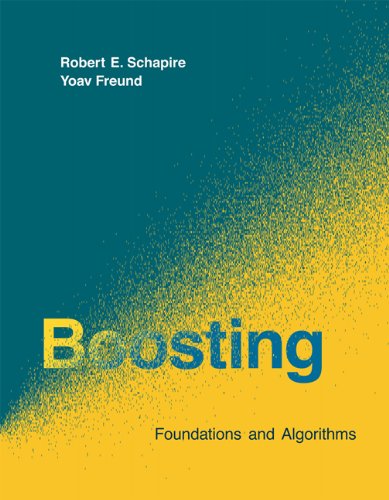
Boosting: Foundations and Algorithms
by Robert E. Schapire, Yoav Freund
Publisher: The MIT Press 2014
ISBN-13: 9780262310413
Number of pages: 544
Description:
Boosting is an approach to machine learning based on the idea of creating a highly accurate predictor by combining many weak and inaccurate 'rules of thumb'. A remarkably rich theory has evolved around boosting, with connections to a range of topics, including statistics, game theory, convex optimization, and information geometry.
Download or read it online for free here:
Read online
(online html)
Similar books
 Optimal and Learning Control for Autonomous Robots
Optimal and Learning Control for Autonomous Robotsby Jonas Buchli, et al. - arXiv.org
The starting point is the formulation of of an optimal control problem and deriving the different types of solutions and algorithms from there. These lecture notes aim at supporting this unified view with a unified notation wherever possible.
(5674 views)
 The Elements of Statistical Learning: Data Mining, Inference, and Prediction
The Elements of Statistical Learning: Data Mining, Inference, and Predictionby T. Hastie, R. Tibshirani, J. Friedman - Springer
This book brings together many of the important new ideas in learning, and explains them in a statistical framework. The authors emphasize the methods and their conceptual underpinnings rather than their theoretical properties.
(40064 views)
 Lecture Notes in Machine Learning
Lecture Notes in Machine Learningby Zdravko Markov - Central Connecticut State University
Contents: Introduction; Concept learning; Languages for learning; Version space learning; Induction of Decision trees; Covering strategies; Searching the generalization / specialization graph; Inductive Logic Progrogramming; Unsupervised Learning ...
(9161 views)
 Machine Learning, Neural and Statistical Classification
Machine Learning, Neural and Statistical Classificationby D. Michie, D. J. Spiegelhalter - Ellis Horwood
The book provides a review of different approaches to classification, compares their performance on challenging data-sets, and draws conclusions on their applicability to realistic industrial problems. A wide variety of approaches has been taken.
(27887 views)